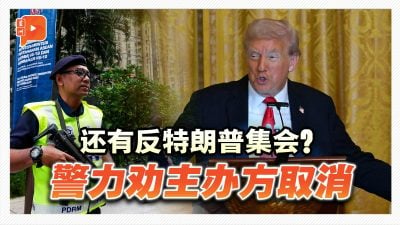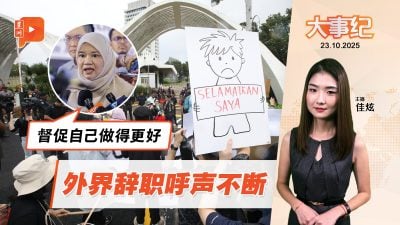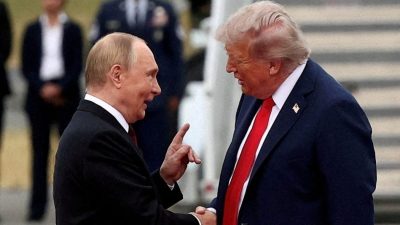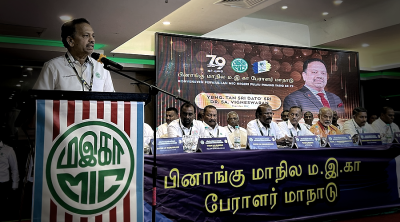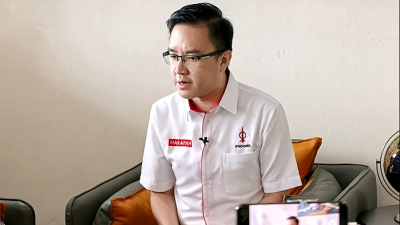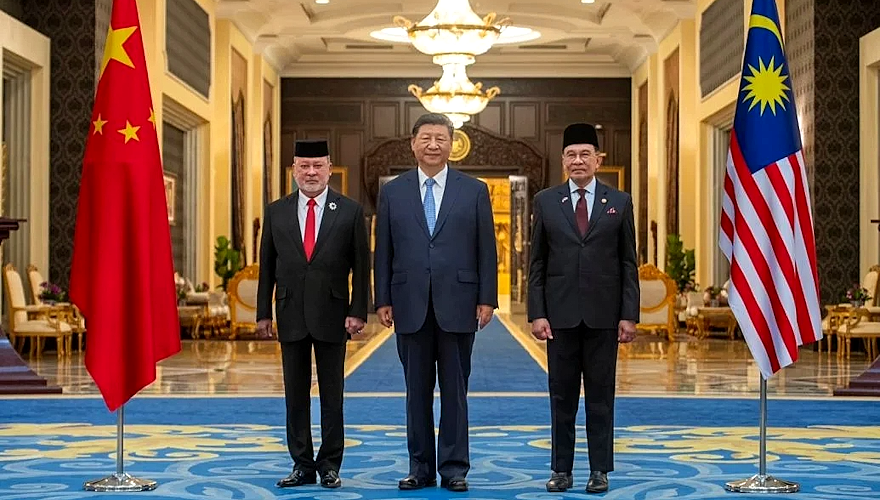
Chinese President Xi Jinping visited Malaysia again after a lapse of 12 years, albeit a brief one this time round.
Compared to his previous visit in 2013, the Malaysian public did not get the chance to come closer to this world leader in unofficial events this time.
In 2013, besides the official welcome ceremony at the Parliament House, Xi also visited Istana Negara and the Prime Minister’s Office to participate in official activities such as state banquets, bilateral talks, witnessing the signing of MoUs, and the Prime Minister’s private banquet.
Besides, he also met with local Chinese groups, Chinese businessmen, Chinese students in Malaysia, as well as officials from the Chinese Embassy in Malaysia, and attended the Malaysia-China Economic Summit.
Notably, the Chinese president also had talks with two former prime ministers—Tun Mahathir Mohamad and Tun Abdullah Badawi who just passed away—on the morning of his departure.
He was accompanied by his wife Peng Liyuan during his previous visit. Accompanied by then Prime Minister’s wife Rosmah Mansor, they visited Istana Budaya for a musical, and later attended a traditional Malaysian handicraft and clothing exhibition.
Xi’s state visit this time, also spanning three days, had official functions scheduled mostly on April 16, and he did not appear in any informal events besides shuttling between his Putrajaya hotel, Istana Negara and Perdana Putra.
Only a few Tan Sri-level Chinese businessmen were invited to the state banquet and the PM’s reception.
There could be some unspeakable reasons behind the low-key arrangements this time.
Xi’s visit coincided with US President Donald Trump’s tariff pressure on the world and Beijing’s powerful, defiant response, which allows the world to see a more confident China.
Unable to force China into submission, it is understandable that Washington is feeling the jitters.
It is therefore not unexpected that Washington is watching very closely Xi’s every move in Southeast Asia, to see whether Vietnam, Malaysia and Cambodia are warming up to Beijing.
Trump said sarcastically after Xi’s Hanoi trip: “I don’t blame China, I don’t blame Vietnam. That’s a lovely meeting. Meeting like, trying to figure out, ‘How do we screw the United States of America?’”
Trump has acted inconsistently ever since his “Liberation Day” announcement, changing his mind almost on a daily basis!
Apparently, Trumps’ tariffs, while sweeping every earthly nation, have targeted specifically China.
Washington may still force other countries to take sides through tariff negotiations. These countries can only wait for an appointment from Washington to get their tariff rates brought down to more acceptable levels.
Minister of Investment, Trade and Industry Tengku Zafrul Tengku Abdul Aziz has said he is heading to Washington this week to discuss tariff issues.
Many might be curious what Malaysia’s position is if the country is forced to take sides during the tariff negotiations. From what I understand, the official answer will sound like this: We will not take sides!
Many might be curious what Malaysia’s position is if the country is forced to take sides during the tariff negotiations. From what I understand, the official answer will sound like this: We will not take sides!
And if Washington keeps pressurizing Malaysia to stop supplying raw materials to China, it is understood that our response will remain: No!
We do not have many options and must consider our own survival. We must make friends and do business with both the US and China, and should not have a hand in the Sino-US rivalry.
Malaysia has consistently pursued a free, open and fair trade policy. Politically we, like other ASEAN states, uphold a neutral position of not taking sides.
As such, we welcome Xi’s visit to strengthen bilateral relations and friendship between Malaysia and China. And if Trump decides to visit us next week, we will definitely receive him with open arms.
Xi announced during his previous visit to this country that the relationship between Malaysia and China had been upgraded to a “comprehensive strategic partnership”.
Since then, cooperation between the two countries has remarkably deepened in the areas of economy, trade, culture and education. For instance, Xiamen University has set up a campus here while a Universiti Malaya campus is slated for next year in China’s Shandong province.
Chinese investments in Malaysia have accelerated since Xi Jinping’s last visit 12 years ago, including the soon-to-be-completed East Coast Rail Link undertaken by China Communications Construction ECRL, Intco in Klang, Geely and Proton, the joint venture between Tan Sri Law Tien Seng and China’s Jianlong Group, Alibaba’s investment in Touch ‘n Go through its subsidiary Ant Group, Gemas-Johor Bahru double-tracking project, Huawei and ZTE, Xinyi Glass, Kibing Solar, and JinkoSolar in Penang, among others.
Tourism between the two countries has received a significant boost since the announcement of mutual visa exemption last year. Hopefully this policy will be made permanent very soon.
In addition to close bilateral relationship, Malaysia also commands a core position in ASEAN-China relations.
Then Chinese Foreign Minister Qian Qichen was invited to the 24th ASEAN Ministerial Meeting (AMM) in Kuala Lumpur in 1991, marking the start of the highly significant ASEAN-China dialogue.
The Malaysia-China partnership has played a pivotal role in connecting China to multilateral cooperation frameworks such as the “ASEAN Plus Three” (China, Japan and South Korea) established in 1997, the East Asia Summit (ASEAN Plus Three and Australia, New Zealand and India) in 2005, and this year’s ASEAN-GCC-China economic forum in Kuala Lumpur.
Notably, these meetings and processes have taken place during Malaysia’s ASEAN rotating chairmanship.
This is by no means a coincidence, but a testimony to Malaysia’s commitment to promoting stronger relations and cooperation with China, as well as regional stability, prosperity and development.
As China is assuming an increasingly more powerful role on the international stage, more countries believe that Beijing will play a key role in the new world order.
It is sad that the US has opted to forgo globalization it has so avidly championed over the years, embracing unilateralism and protectionism instead.
On the contrary, Xi’s advocacy of “Community of Common Destiny for Mankind” serves to remind the world of the importance of peaceful coexistence and common prosperity.
In the wake of such unprecedented shift in the global environment, Malaysia simply cannot afford to take sides.
We are only a small country, and all we can do is to defend our own interests through a more versatile, forward-looking and neutral approach in dealing with the world.
As for the US and China, only cooperation can lead to a win-win situation. Neither of the two world powers will benefit if they decide to turn against each other, potentially triggering World War III and heightened risks of global instability.
ADVERTISEMENT
ADVERTISEMENT






